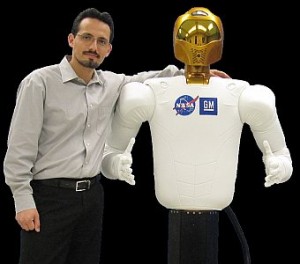IEEE JRACS Seminar: NASA-GM Robonaut 2 – The Advent of the Robotics & Automation Revolution
Dear IEEE Society Members,
This is an announcement for an IEEE JRACS Chapter meeting and monthly Technical Seminar.
If you are planning to attend please register using the link below.
This is an open event, so please feel free to forward this information to your colleagues or anyone that could be interested in the topic.
Meeting Agenda:
11:30am Networking & Registration
11:45pm Technical Presentation
12:30pm Q&A
12:45pm Adjourn
Best,
IEEE Joint Robotics & Automation – Controls Systems (JRACS) Society
IEEE Huntsville Section, Huntsville, AL
IEEE Joint Robotics & Automation – Controls Systems (JRACS) Chapter Seminar
NASA-GM Robonaut 2: The Advent of the Robotics & Automation Revolution
By Leandro G. Barajas Ph.D., PMP
Location:
Dynetics, Inc.
Solutions Complex, Main Conference Room
1004 Explorer Blvd.
Huntsville, AL 35806
Date:
Friday October 19, 11:30am-12:45pm
Please RSVP by COB on 10/17/2012
https://meetings.vtools.ieee.org/meeting_view/list_meeting/14811
and under “Menu Selection” provide your US Citizenship Status
Lunch will be provided
Abstract:
Reaching the technological revolution of the Neolithic took modern humans over 200,000 years. Another 12,000 years later, in the 18th and 19th centuries, the Industrial Revolution brought unprecedented advances in agriculture, manufacturing, mining, transportation, science and technology. In the last century alone we have gone through the Atomic, Jet, and Space Ages, and we are now in the midst of the Information Age. The next major technological milestone still to come, “The Robotics & Automation Revolution”, will not take millennia, centuries or even decades, it will be upon us in only a few years. This Cybernetic Singularity will not just be a tipping point but a process where humanity will continuously augment its physical, mental, emotional and social capabilities via effective machine-brain interfaces to a level that they become fully embodied and therefore indistinguishable from its own.
From the large scale manufacturing point of view, the main areas of immediate technological development that will enable this transformation include the mastering of high level & intuitive human-robot interfaces, flexible & robust perception, highly flexible & dexterous robots/automation/end-effectors, safe integration & harmony with humans, and distributed robotic intelligence that can learn from social interaction. By changing paradigms from robots programmed offline, to tele-operated robots, to learning robots, to thinking robots and eventually to autonomous robots, we aim to enhance and complement the role of humans on the production line by reducing or eliminating worker time spent on routine, non-critical, dangerous, or repetitive functions as well as by compensating for human physical, environmental, and cognitive limitations. Exemplifying this approach, General Motors and NASA partnered to develop Robonaut 2 (R2), the first humanoid robot in space. R2 took flight aboard the STS-133 Shuttle Discovery and became a permanent resident of the International Space Station.
Speaker Bio:
Dr. Leandro G. Barajas is a Senior Engineer and Project Manager at the Unmanned Systems and Aerodynamics Department, at Dynetics, Inc. Previously, he was a Staff Researcher at the Advanced Robotics Group, Manufacturing Systems Research Laboratory at General Motors Global R&D Center in Warren, MI, USA. He received the Honor Degree in Electronics Engineering as Valedictorian from the Universidad Distrital F.J.C., Bogotá, Colombia, in 1998. He received M.S. and Ph.D. degrees in Electrical and Computer Engineering from the Georgia Institute of Technology (Georgia Tech), Atlanta, GA in 2000 and 2003, respectively.
Dr. Barajas has worked on the areas of unmanned systems, robotics & automation and intelligent perception where was responsible for designing and leading the global development of an integrated cross-platform framework for automotive assembly robot control. This framework encompasses robot vision, robot & automation control, high-level intelligent & flexible perception, human-robot interaction & learning, and highly flexible & dexterous robots/end-effectors. He has authored over 60 technical publications and 50 invention disclosures that in turn have been translated into over 30 patents & patent applications.
Dr. Barajas has been distinguished with over 40 corporate, academic and professional awards including: 4 “Boss” Kettering Awards (GM’s top technical honor), 3 McCuen Awards (GM R&D’s top honor), Chairman Honors Award (GM’s top corporate honor), GM R&D “Spark Plug” Award, Elected IEEE Senior Member, SME Outstanding Young Manufacturing Engineer Award, IEEE Robotics & Automation Early Career Award, Federal Laboratory Consortium (FLC) Award for Excellence in Technology Transfer, the NASA JSC’s Exceptional Software Award and the NASA Exceptional Space Act Award for the development of Robonaut 2.

